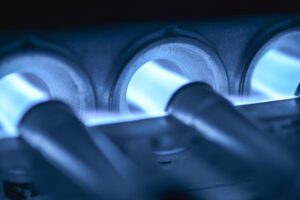
Winter isn’t coming, it’s here.
To beat the cold, you’re probably investigating the best and most cost-efficient way to heat your home. The center of this debate for the modern homeowner is the battle of heat pump vs furnace.
HVAC retailers might make this debate even more confusing by listing “furnaces/heat pumps” as a single option. How do you know which one to choose? Which one is the best for your needs?
Here’s everything you need to know about the differences between the two most common home heating solutions.
Furnaces
Furnaces are the most common heating system used in the United States. They work by heating the air inside of a central unit and distributing that heated air throughout the home via pipes or ducts.
To heat the air in that central unit, furnaces burn fuel. This fuel is usually gas, but some furnaces use oil instead. The furnace releases any byproducts from this gas burning via flue, similar to the way that chimneys release smoke.
Because of the way that furnaces operate, they are ideal for homes in colder climates. Even the iciest weather will have a difficult time putting a stop to a furnace, no matter how old.
Speaking of age, furnaces have a fairly long lifespan, too. Most homes built in or before the 20th-century use furnaces as their heating option. This likely stems from the fact that furnaces are easy and often cheap to install, repair, and replace.
Furnaces aren’t always the most energy-efficient option, though. According to the Annual Fuel Utilization Efficiency (AFUE) Scale, furnaces typically report an efficiency of about 95%. This scale can extend up to 400%, though, rather than just 100%, meaning that furnaces fall near the bottom of the spectrum.
Heat Pumps
Heat pumps are a newer, more energy-efficient alternative to traditional furnaces. The average heat pump boasts an AFUE rating of about 300%, a little more than 3x as much as the average furnace.
This rating makes sense given that heat pumps don’t need to burn fuel to operate. Instead, they move hot air between the interior of the home and the exterior depending on the temperature the owner sets. In other words, the heat pump will move warm air inside during colder months and outside during warmer months.
Heat pumps use this same technology to keep your home cool. This means that they function as both heat sources and air conditioners.
The only downside to this functionality is that the temperatures heat pumps produce are often less extreme than those from furnaces and air conditioning units. It’s also much more common for severe cold and ice to stall heat pumps. Both of these factors make heat pumps more ideal for homes in mild climates.
Like furnaces, heat pumps can convey heat through pipes and ducts. They can also heat your home through the floorboards.
Heat Pump vs Furnace: Overview
In summary, here’s a description of the differences between heat pumps and furnaces:
Heat Pumps
- Usually in newer homes
- Generate heat by moving hot air in and out of the home
- Best for mild climates
- Extremely energy efficient
Furnaces
- Usually in older homes
- Generate heat by burning fuel
- Best for colder climates
- Moderately energy efficient
More HVAC Advice for Homeowners
Deciding between a heat pump vs. furnace isn’t the only HVAC issue you’ll encounter as a homeowner. You might also be asking yourself, “What brand of air conditioner should I buy?” or “How difficult is it to replace this part?”
For the answers to these questions and more, Murphy Home Services is at your service. Contact us today to ask about our product recommendations and repair services.








